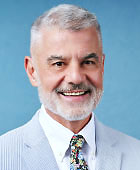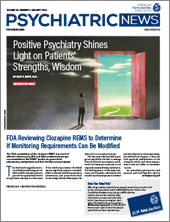Over the past year, much of my work as APA president has been centered around the theme “Confronting Addiction From Prevention to Recovery.” This work has been focused around four main topic areas that represent some of the most common and challenging areas of addiction medicine: opioids, alcohol, vaping, and technology.
This theme will also carry over to the Annual Meeting in New York City (May 4 to 8), where it will serve to both focus the scientific program and create space for special sessions centered around confronting some of the most pressing psychiatric issues of the day.
I am excited to see how the work we have done in our public information and engagement efforts translate to the scientific sessions on our program. Attendees at the special sessions on addiction will have access to some of the most cutting-edge information on the diagnosis and treatment of substance use disorders (SUDs) now available. While the majority of the work that has been done as part of my presidential initiative so far has been targeted to the public, we have also created messaging and resources aimed at physicians and emphasized collaboration with our partners in the house of medicine.
One of the fruits of that collaboration is a pair of top 10 lists designed to share essential information on addiction. The Top 10 Things Everyone Should Know About Addiction is aimed at a general audience, while the Top Ten Things Every Physician Should Know About Addiction is aimed at doctors who may encounter addiction in the course of their practice, but may have some unanswered questions about how to best approach treatment for patients with addiction. These lists were produced in collaboration with the American Academy of Addiction Psychiatry, the American Academy of Family Physicians, and the American Society of Addiction Medicine. We will continue to pursue opportunities for collaboration with these and other potential partners during the course of this initiative.
Public education and engagement remain the bedrock of our mission with the presidential initiative on confronting addiction. Results from the first two mini-campaigns on vaping and opioids have been very promising, with millions of people reached through our various efforts across social media, print media, and op-eds; animated explainer videos on YouTube; Psychiatric News special reports; and blogs on Psychiatry.org. Naloxone Nation, a docu-series on opioid use disorder, was just launched and is steadily building a viewership. What these numbers tell us is that there is a public out there that is hungry for evidence-based information on SUDs and for guidance from physicians on how to approach and access treatment.
I know that thanks to the fantastic work of our Scientific Program Committee, and the knowledge and expertise of our members, attendees will come away from the Annual Meeting with practical knowledge they can implement right away in their home community, whether they work at a large hospital system or in private practice. I hope you’ll join us in New York City in May to take advantage of a fantastic opportunity for learning and networking at the premiere psychiatric event of the year. ■

